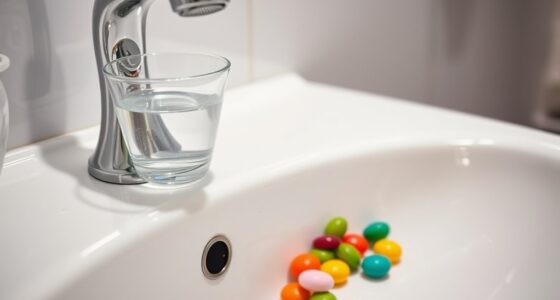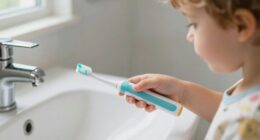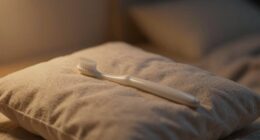Mixing your child's toothpaste with other ingredients isn't the clever trick some parents think it is. This DIY approach can actually compromise the fluoride's effectiveness, diminishing its protective qualities. Plus, using clear containers can expose fluoride to light, harming its benefits. You might think you're being creative, but you're risking your child's oral health. Instead, consider using fun flavors or non-foaming toothpaste designed for sensitive mouths, which can help make brushing easier. If you want to explore better alternatives and expert tips, keep going to uncover effective solutions for your child's dental routine.
Key Takeaways
- Mixing fluoride toothpaste with other products can reduce its effectiveness, compromising your child's oral health protection.
- Non-foaming, milder toothpaste options help children with sensory issues feel more comfortable while brushing.
- Using fun flavors like bubblegum can encourage kids to brush regularly and develop positive dental habits.
- Regular dental check-ups from age one ensure early detection of issues and promote good oral hygiene practices.
The Risks of DIY Toothpaste Mixing

Mixing your own toothpaste might seem like a clever idea, but it can actually compromise the effectiveness of the ingredients. When you combine fluoride toothpaste with other products, like mouthwash, you risk losing the active ingredients that are meant to protect your teeth. This can diminish the oral health benefits you and your family rely on.
Storing these mixtures in clear containers can also expose them to light, which degrades certain components over time. This means the fluoride in your custom concoction may not work as well as it should.
Additionally, transferring products can introduce contaminants, making your DIY mix less safe for daily use.
Effective Alternatives for Oral Hygiene

Finding effective alternatives for oral hygiene can make a big difference in your family's dental care routine. If you're looking to maintain good dental health without traditional toothpaste, consider these options that still support fluoride benefits.
- Water: On days when brushing feels like a chore, rinsing with water can help remove food particles and keep your mouth clean temporarily.
- Mouthwash: A fluoride mouthwash can offer additional protection by rinsing away debris and freshening breath, especially when brushing isn't feasible.
- Chewable Tabs: Products like Listerine Ready! tabs provide on-the-go convenience, allowing you to maintain oral hygiene without needing toothpaste.
- Xylitol Gum: This gum not only tastes good but also helps reduce bacteria in the mouth and promotes saliva production, which is essential for keeping teeth healthy.
These alternatives can be especially helpful for kids who might be sensitive to traditional toothpaste flavors or textures.
Understanding Sensory Issues With Toothpaste

Many kids struggle with the taste and texture of traditional toothpaste, making it harder for them to maintain good oral hygiene. This discomfort can stem from ingredients like sodium lauryl sulfate (SLS), which often irritates sensitive mouths and compounds sensory issues.
If your child finds the foaming action overwhelming, consider using non-foaming toothpaste options. These can greatly reduce sensory overload during brushing.
Flavor plays an essential role too. Many children prefer fun flavors like bubblegum or fruit, which can make brushing more enjoyable and encourage them to brush regularly. If your child continues to resist, exploring alternatives like xylitol gum or chewable tabs might help maintain their oral hygiene without the traditional brushing method.
Additionally, using an electric toothbrush can make the experience more engaging and effective. The vibrating action may also provide a different sensory experience that some kids find more tolerable.
Expert Recommendations for Parents

When it comes to your child's dental care, experts emphasize the importance of using fluoride toothpaste to strengthen teeth and prevent cavities effectively. Starting at age two, using fluoride toothpaste can make a significant difference in your child's oral health.
Here are some expert recommendations to help you establish good brushing habits:
- Supervise Brushing: Always supervise your child while they brush, ensuring they use a pea-sized amount of toothpaste and avoid swallowing it to prevent excess fluoride intake.
- Choose Appealing Flavors: Introduce toothpaste flavors your child enjoys, like bubblegum or fruity options, to make brushing more enjoyable and encourage consistency.
- Make it Fun: Turn brushing into a fun routine by incorporating songs or games. This helps your child develop a positive association with oral hygiene.
- Regular Check-Ups: Schedule dental check-ups starting at age one. These visits are essential for monitoring your child's dental health and catching any issues early.
Community Support and Shared Experiences

Parents often come together to share their experiences and insights, creating a supportive community that helps tackle the challenges of children's oral hygiene.
You'll find that many discussions center around effective toothpaste alternatives, especially for kids who resist traditional options. Parents often share anecdotes about how flavored children's toothpaste can make brushing fun and engaging, which can greatly reduce plaque buildup.
In these community exchanges, you might discover tips for managing sensory issues related to toothpaste. Recommendations for non-foaming or milder options frequently pop up, proving helpful for children sensitive to texture or taste.
Social media platforms serve as a hub for collaborative posts where parents support each other in finding creative solutions for maintaining their children's oral hygiene.
Feedback from these discussions emphasizes the importance of sharing product recommendations. Many families have seen improvements in their dental care practices simply by trying suggestions from other parents.
Frequently Asked Questions
What Do Dentists Not Want You to Know?
Some dentists might not emphasize the risks of overusing whitening toothpaste, which can harm your enamel. They also may downplay the importance of flossing, even though it's essential for maintaining overall dental health.
What to Do if Your Parents Don't Take You to the Dentist?
If your dental health feels like a neglected garden, talk to your parents about the importance of check-ups. You can also seek help from a trusted adult or find nearby clinics offering affordable services.
Do Dentists Recommend Hello Toothpaste?
Yes, dentists often recommend Hello toothpaste due to its natural ingredients, fluoride content, and kid-friendly flavors. It's a great choice for promoting good oral hygiene while being ethical and suitable for sensitive teeth.
How Much Toothpaste Should a 13 Year Old Use?
So, you think a whole tube's necessary? Nope! Just a pea-sized amount of fluoride toothpaste is all you need. Brush twice daily for two minutes, and you'll keep those pearly whites shining bright!
Conclusion
In summary, while the toothpaste trick might seem tempting, it's essential to prioritize your child's dental health. One of the most important aspects of dental health is regular visits to the dentist for check-ups and cleanings. While the toothpaste trick may provide a quick fix, it is not a substitute for professional dental care. In the long run, neglecting regular dental visits can lead to more serious issues and potentially higher costs if the child’s dentist charges for more extensive treatments. It’s important to instill good dental habits in children from a young age and prioritize their long-term oral health. Additionally, the truth about charcoal toothpaste is that it may not be as effective as traditional toothpaste in preventing cavities and maintaining overall oral health. While it may provide a whitening effect, it could also be abrasive and cause damage to the enamel over time. Therefore, it’s crucial to choose toothpaste that is recommended by dental professionals and to stay informed about the potential risks of trendy dental products. Ultimately, prioritizing your child’s dental health means making informed decisions and seeking professional guidance when it comes to their oral care.
Did you know that nearly 40% of children aged 2 to 11 have had cavities in their primary teeth?
Instead of mixing up DIY solutions, consider expert recommendations and effective alternatives to guarantee proper oral hygiene.
Remember, fostering a positive brushing experience can make all the difference.
Join community discussions to share tips and support for a healthier smile!









